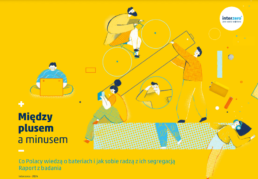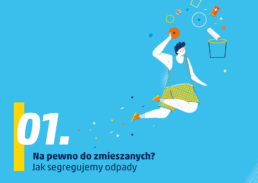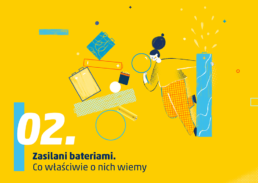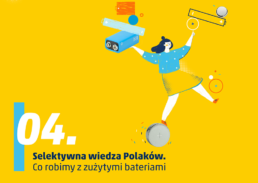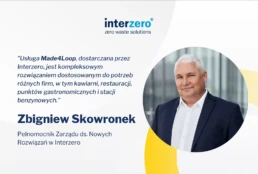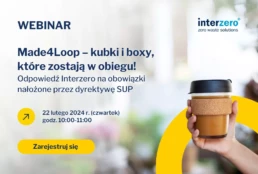Nowy raport „Między plusem a minusem”
Nowy raport Interzero „Między plusem a minusem”
Z okazji Dnia Baterii, w ramach kampanii Eko bez kantów, publikujemy raport z badań “Między plusem a minusem – co Polacy wiedzą o bateriach i jak sobie radzą z ich segregacją?”. Wyniki są zaskakujące. Mimo świadomości obowiązku selektywnej zbiórki odpadów, wielu z nas wciąż się z niego nie wywiązuje. Polacy postrzegają baterie jako szkodliwe zarówno w trakcie produkcji, jak i podczas składowania. Za niebezpieczny dla środowiska uznali również recykling. Mimo wielu lęków, jakie budzą baterie, nie zastanawiamy się nad źródłem zasilania w naszych urządzeniach.
Jeszcze nigdy w historii nie produkowaliśmy i nie zużywaliśmy tak wielu baterii. Według prognoz McKinsey & Company ich rynek będzie rósł w tempie 25% rocznie, a w przypadku ogniw litowo-jonowych może osiągnąć 30% rocznego wzrostu do 2030. Ten popyt jest nakręcany m.in. przez rozwój przenośnych technologii cyfrowych, banków energii czy elektromobilności. Wraz z tym dynamicznym postępem branży bateryjnej, pojawia się pytanie o przyszłość zagospodarowania tych nowych odpadów.
W naszym najnowszym badaniu pt. „Między plusem a minusem” zapytaliśmy o zwyczaje Polaków dotyczące selektywnej zbiórki odpadów, w tym odpadów niebezpiecznych. Chcieliśmy poznać także ich motywacje i przekonania odnośnie do recyklingu baterii. Pozytywnie nastraja fakt, że w deklaracjach znacząca część ankietowanych wie, jak prawidłowo postępować z zużytymi bateriami. Jednak poważne wątpliwości pojawiają się w przypadku bardziej szczegółowych pytań. Uwagę zwraca przede wszystkim brak wiedzy dotyczącej korzyści, jakie płyną z recyklingu baterii i obawy związane ze szkodliwością tego procesu. Kruchość łańcuchów dostaw i ograniczone złoża surowców w Unii Europejskiej sprawiają, że zużyte baterie i akumulatory powinniśmy traktować jako zasoby strategiczne. Obecny w ogniwach lit, nikiel, mangan czy grafit mają wręcz znaczenie krytyczne. Pozyskanie tych pierwiastków, niezależnie od źródeł, jest kosztowne i obarczone ryzykiem, a zastąpienie ich w technologiach na tym etapie rozwoju wydaje się po prostu niemożliwe. Znaczenie recyklingu w tym kontekście jest więc zarówno działaniem na rzecz ochrony środowiska, jak i zapewnienia bezpieczeństwa surowcowego Europy.
W raporcie „Między plusem a minusem” zaskakuje także grupa młodych dorosłych, którzy okazali się mniej skłonni do zachowań ekologicznych niż starsi. Respondenci poniżej 35 roku życia nie tylko rzadziej segregują odpady, ale także częściej wątpią w sens przetwarzania surowców wtórnych. To odpowiedzi tej grupy powinny szczególnie pobudzić do refleksji na temat skuteczności dotychczasowych działań edukacyjnych i legislacyjnych.
Więcej informacji dowiesz się z notatki prasowej TUTAJ.
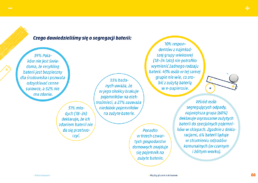
Entrepreneur! Remember about the annual BDO fee!
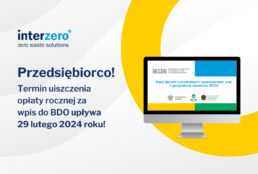
Entrepreneur! Remember about the annual BDO fee!
February 29 is the deadline for paying the annual fee for entry into the BDO in the amount of PLN 100 (micro-entrepreneurs) or PLN 300 (entrepreneurs other than micro-entrepreneurs). The fee should be paid to the account of the marshal’s office competent for the company’s registered office or place of residence.
Failure to pay the fee will result in removal from the Database on Products, Packaging and Waste Management (BDO) , and the business activity will be subject to a high financial penalty!
Entrepreneurs are subject to registration and annual fees:
- introducing electrical and electronic equipment and authorized representatives,
- introducing batteries or accumulators,
- introducing vehicles,
- producer, importer and intra-Community buyer of packaging,
- introducing products in packaging into the territory of the country,
- introducing tires into the territory of the country,
- introducing lubricating oils into the territory of the country.
Are you looking for support during the reporting period ?
Watch the free Interzero webinar „Everything you need to know about BDO”
More training at a favorable price can be found HERE
Jak postrzegamy...odpady? Słów kilka o projekcie „Obieg zamknięty. Odpady w fotografii”
Jak postrzegamy… odpady? Słów kilka o projekcie „Obieg zamknięty. Odpady w fotografii”
Odpady są to substancje lub przedmioty, których ludzie pozbywają się, ponieważ uważają je za niepotrzebne, zużyte lub niebezpieczne. Mogą być to np. resztki jedzenia, opakowania, zużyte baterie, chemikalia czy zużyty sprzęt elektroniczny. Emocje, jakie wzbudzają w ludziach, mogą być różnorodne i zależą od wielu czynników, takich jak świadomość ekologiczna, poziom wykształcenia czy kultura.
Dziś rozmawiamy o nieuchronnej potrzebie przemiany oraz skutkach ludzkiej działalności w obszarze energetyki, rolnictwa, produkcji, konsumpcji i gospodarowania odpadami. Każdy z tych tematów jest palący, a nasz czas staje się coraz bardziej ograniczony.
Jako edukatorzy ekologiczni, stajemy przed poważnymi wyzwaniami. Musimy nie tylko przekazywać wiedzę, ale także oddziaływać na emocje naszych odbiorców. To wymaga refleksji, wyrozumiałości i zaopiekowania się uczestnikami procesu edukacyjnego. Nasza praca musi być skuteczna. Budowanie świadomości społecznej to proces, w którym warto eksperymentować i angażować różne grupy ludzi oraz różnorodne tematy.
Jako Interzero, reprezentując sektor biznesu, postanowiliśmy zrealizować projekt z Muzeum Fotografii w Krakowie „Obieg zamknięty. Odpady w fotografii”. Projekt zakładał cykl spotkań, w wyniku których powstaną fotografie i teksty dowolnie nawiązujące do tematu odpadów.
Serdecznie dziękujemy Marii Masternak i Annie Sidorskiej z Muzeum Fotografii w Krakowie, prowadzącym warsztaty Rafał Siderski i Krzysztof Story, wszystkim uczestnikom oraz naszej Kierowniczce Projektu Monice Krysztofińskiej.
Jesteśmy pod ogromnym wrażeniem efektów tego projektu. Cieszymy się, że temat odpadów, jest ważny nie tylko dla nas, ale również dla szerszego grona społeczności, która wierzy, że wspólnym działaniem można osiągnąć wiele dobrego.
Więcej informacji o projekcie znajdziecie w publikacji na Eko Bez Kantów: TUTAJ
Fot. Mateusz Woźniak, Magdalena Niezabitowska Krogulec, Tomasz Orłowski, Marta Wróblewska
Did you know that one of the European countries can benefit 100 percent? from renewable energy by 2025?

Did you know that one of the European countries can benefit 100 percent? from renewable energy by 2025?
Since March 2016, no coal-fired power stations have been operating in Scotland. Then the Longannet power station, located north-west of Edinburgh, which had been operating since 1973, was closed. This means that after 115 years, Scotland has stopped generating electricity from burning coal.
Statistics show that the share of renewable energy in Scotland’s total electricity consumption was 97.4%. in 2022, while a year earlier it was 90.1%. Scotland owes this result primarily to the development of onshore wind farms, which provided approximately 70%. green energy in the country. The remaining 30 percent provided offshore wind farms and hydroelectric power plants.
Scottish Renewables, the renewable energy industry association in Scotland, highlights how much progress has been achieved over the last decade. In 2011, the share of energy from renewable sources in the overall energy balance was only 37%.
The latest data shows that Scotland can benefit from 100%. from renewable energy by 2025 and even start transporting the surplus to other countries.
Plans include the installation and commissioning of a new wind farm of 60 SG 14-222 DD turbines for Moray West, an offshore wind farm owned by Ocean Winds, located off the coast of north-east Scotland in 2024. Each turbine will have an individual power of 14.7 MW; At the moment, it is the most powerful wind turbine ever created. Currently, Scotland is close to achieving the goal of full use of energy from renewable sources in the national electricity sector, and by 2030 the Scottish authorities plan to achieve a 50% share of renewable energy in the total consumption of electricity, heat and transport. The long-term goal is to achieve almost complete decarbonization by 2050.
Made4Loop – the answer to the new SUP responsibilities
Made4Loop – the answer to the new SUP responsibilities
Although the era of free disposable cups is slowly coming to an end, the changes do not have to mean a chaotic revolution in the company.
From July 1, 2024, entrepreneurs selling drinks in disposable cups will have to provide their customers with alternative packaging that will be more environmentally friendly. This change aims to reduce the amount of plastic waste and is one of the most controversial legislative moves regarding environmental protection in recent years. Although for many it may seem like just another legal and office formality, business owners may lose sleep because it means the need to take decisive action and look for effective solutions.
Therefore, entrepreneurs may consider introducing reusable packaging or packaging made of other materials, including oxo-degradable plastics. Alternatively, they may decide to introduce a deposit system for reusable packaging, which would allow them to be returned and reused.
That is why the Interzero service was created, based on a deposit system for reusable packaging. The Made4Loop model involves the use of reusable cups and packaging, which customers rent for a deposit and then return via a deposit system. In this way, the packaging remains in a closed loop and is reused dozens, if not hundreds of times.
You can find out more in the press release HERE
We would like to remind you that on February 22 there will be a webinar during which Zbigniew Skowronek himself will talk more about the Made4Loop service from Interzero. Registration at the link HERE
Weź udział w szkoleniu Made4Loop – kubki i boxy, które zostają w obiegu! Odpowiedź Interzero na obowiązki nałożone przez dyrektywę SUP
Weź udział w szkoleniu Made4Loop – kubki i boxy, które zostają w obiegu! Odpowiedź Interzero na obowiązki nałożone przez dyrektywę SUP
Serdecznie zapraszamy na webinar pt. „Made4Loop – kubki i boxy, które zostają w obiegu! Odpowiedź Interzero na obowiązki nałożone przez dyrektywę SUP”, który odbędzie się już 22 lutego 2024 roku (czwartek).
Szkolenie online poprowadzi: Zbigniew Skowronek, Pełnomocnik Zarządu ds. Nowych Rozwiązań w Interzero
Zakres webinarium:
- Nowe obowiązki dla przedsiębiorców wynikające z dyrektywy SUP,
- Opłata konsumencka za kubki i boxy,
- Obowiązek zapewnienia alternatywy dla opakowań jednorazowych od 1 lipca 2024,
- Czym jest looping? Definicja, grupy docelowe,
- Made4Loop
Więcej szczegółów oraz stronę rejestracji znajdziesz pod linkiem TUTAJ
Rejestracja na webinar trwa do: 22 lutego 2024 roku do godziny 8:00.
Zapraszamy!
Interzero w gronie laureatów Diamenty Miesięcznika Forbes 2024!
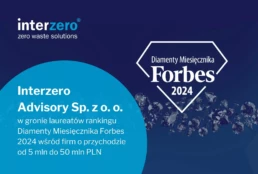
Interzero w gronie laureatów Diamenty Miesięcznika Forbes 2024!
Mamy przyjemność poinformować, że w rankingu Diamenty Forbesa 2024: przychody od 5 do 50 mln PLN spółka grupy Interzero w Polsce – Interzero Advisory sp. z o. o. – znalazła się na 77 miejscu w województwie mazowieckim oraz 311 miejscu na liście ogólnopolskiej!
Diamenty Miesięcznika Forbes to jeden z czołowych rankingów wśród firm prywatnych działających w Polsce, którego celem jest identyfikacja przedsiębiorstw o najbardziej dynamicznym wzroście w danym regionie, które osiągnęły najwyższy średni roczny wzrost wartości. Zestawienie oparte jest o szwajcarską metodę wyceny spółek, która uwzględnia m.in. wyniki finansowe czy wartości aktywów.
Serdecznie dziękujemy za to prestiżowe wyróżnienie; to dowód nieustającego rozwoju i wynik ciężkiej pracy naszych pracowników, a także istotny wskaźnik umacniającej się pozycji na rynku.
Pełne zestawienie dostępne na oficjalnej stronie projektu.
Czy brak odpadów może stać się problemem? Wypowiedź Anny Grom i Pawła Lesiaka dla Dziennik Gazeta Prawna
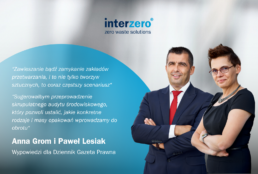
Czy brak odpadów może stać się problemem? Wypowiedź Anny Grom i Pawła Lesiaka dla Dziennik Gazeta Prawna
Bez efektywnego recyklingu, nie spełnimy obowiązków związanych z zamykaniem obiegu surowców, co grozi wysokimi karami. Jednak już dziś możemy podjąć odpowiednie działania, zamiast bezczynnie czekać na zmiany.
Na ten temat w Dziennik Gazeta Prawna wypowiedzieli się Przedstawiciele Zarządu Interzero: Anna Grom i Paweł Lesiak.
„Zawieszanie bądź zamykanie zakładów przetwarzania, to coraz częstszy scenariusz również w Niemczech czy we Włoszech, czyli w państwach, gdzie nakłady finansowe na system zbiórki, sortowania, transportu i przetwarzania były od lat i wciąż są, dużo wyższe, niż w Polsce” – mówi Anna Grom.
„Sytuacja ewidentnie wymknęła się spod kontroli, bo nikt chyba nie zakładał, że UE będzie masowo importować recyklat z drugiego końca świata, o którego składzie i jakości nic nie wiemy. Najwyższa pora ograniczyć import niesprawdzonych i często nieprawdziwie oznaczonych surowców wtórnych. Wypierają one bowiem z rynku lepszy jakościowo, ale droższy surowiec przetwarzany na miejscu. Takie zamknięcie granic może wyjść wszystkim na dobre.” – mówi Paweł Lesiak.
„Sugerowałbym przeprowadzenie aktualnego i skrupulatnego audytu środowiskowego, który pozwoli jednoznacznie ustalić, jakie konkretne rodzaje i masy opakowań wprowadzamy do obrotu. Tegoroczne doświadczenia pokazały, że nawet duże podmioty, z uwagi na brak rzetelnej weryfikacji, potrafią zawyżać masę opakowań nawet o 40 proc.” – dodaje Paweł Lesiak.
Zachęcamy do zapoznania się z całym materiałem „Gdy brak odpadów staje się problemem – czy czekają nas milionowe kary?” pod linkiem: TUTAJ
26 stycznia biura Interzero NIECZYNNE
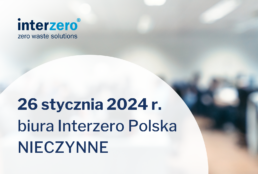
W dniu 26 stycznia 2024 roku biura Interzero są nieczynne.
W związku z uchwałą Zarządów spółek grupy Interzero w Polsce, w dniu 26 stycznia br. wszystkie biura Interzero są nieczynne.
Na wszelkie wiadomości odpowiemy po powrocie.
Za wszelkie niedogodności przepraszamy.
Grupa Interzero opłakuje Markusa Müllera-Drexela
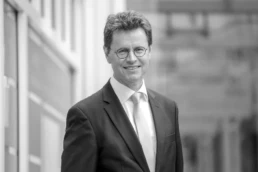
Grupa Interzero opłakuje Markusa Müllera-Drexela
Grupa Interzero w Polsce wyraża ubolewanie z powodu śmierci Markusa Müllera-Drexela, CEO Interzero. Wszyscy jesteśmy głęboko pogrążeni w smutku z powodu utraty tego znakomitego lidera, związanego z Interzero od niemal 30 lat.
Więcej informacji w komunikacie prasowym w j. niemieckim: TUTAJ
